#right one was initially going to have 'i survived being doomed by the narrative' shirts but i got lazy
Text

bugs. gay ones, even
#hollow knight#quirrelhollow#hk quirrel#hk the hollow knight#thk#quirrel#ive been doing pomodoro method for packing and rewarding myself with ipad time#right one was initially going to have 'i survived being doomed by the narrative' shirts but i got lazy#please enjoy more gay bugs. i want to draw others eventually but i need to put thoughts into How i want to draw them#so will likely have to wait until after move#also shoutout to yrlocalghost for letting me appear out of nowhere slap art into a discord convo and then vanish again#i dont have anywhere else to test post/preview stuff (god knows im not posting qh art in the hk discord)#makes me less anxious when Someone Else likes it before i post anything :')#lorne art
297 notes
·
View notes
Text
Star Wars: The Last Jedi Spoiler Discussion
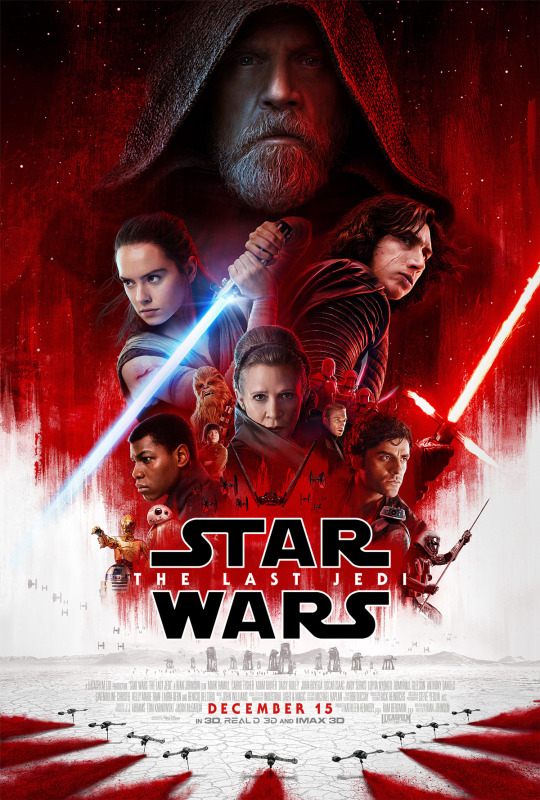
This isn’t so much a review as it is a discussion of some of the film’s core themes. Overall, I thought the film was excellent. It’s one of my favorite installments in the franchise. Go see it. And once you have, feel free to read this, since I’m going to get into some spoilers.
10/10
SPOILERS FOR THE LAST JEDI
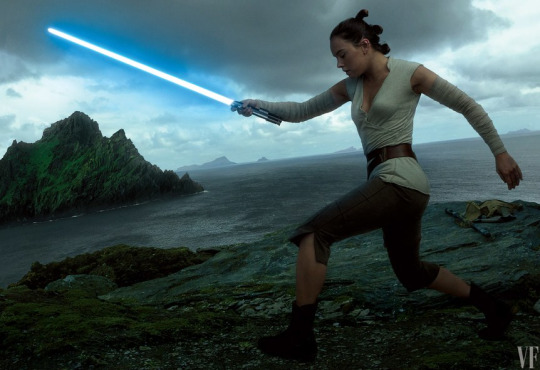
The thing that really struck me about the Last Jedi was how thematically rich it was in comparison to previous Star Wars films. While the series has always had a specific formula, with a binary morality system, The Last Jedi blows that up. This is a film that is fundamentally about deconstructing these symbols and asking what they mean today. I think a lot of the divisiveness about the film amongst fans (although not all of it, there are plenty of valid arguments you can make against it), comes down to either frustration that they are being expected to do that, or a disinterest in the exercise as a whole.
I have trouble seeing eye to eye with that perspective. I’ve seen arguments stating that the characters are fundamentally in the same place at the end of the film, or that various strands don’t go anywhere, but I think that ignores a lot of what the film is doing. If Star Wars movies have always been about underdogs achieving success against great odds, Last Jedi is fundamentally about failure. This is not just me intellectualizing by the way, the film clearly states that intention, repeatedly, in every one of its storylines. So let’s go through this film narrative strand by narrative strand, and examine what it’s doing here.
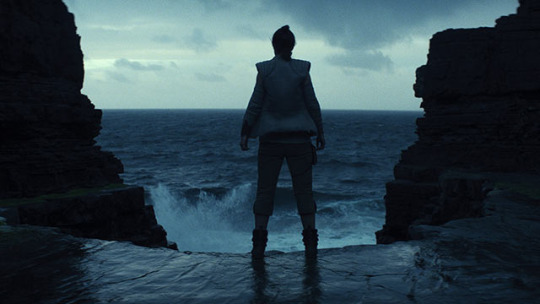
I’m going to start with the film’s most criticized thread, Finn’s journey to Canto Bight in search of the code breaker. When we first meet Finn this time around, he’s acting very much like he did in the first film. He wants to flee from the rebellion ship, not out of disloyalty, but rather fatalism. To Finn, the Rebellion is doomed, and has always been doomed. Even his heroism last film was less about saving the Rebels base, and more about rescuing Rey. Finn sees the merits of individuals, but not of an organization or concept. The film proceeds to pair him with Rose not out of a desire to just include a new love interest, but to place him next to a true believer, someone he would connect with on an empathic level (her own wounds after the death of her sister, portrayed in one of the film’s greatest action beats, make her as much of a wounded soul as Finn himself). Their journey takes them to the Las Vegas of the stars, a tantalizing world of glossy imagery and beautiful looking prosthetic aliens (the most prosthetic creatures in any single set in the history of the franchise).
Finn is instantly enraptured by the place. Rose, in contrast sees what it really is, a source of oppression and suffering. The horse races hide the torture of sentient animals. Children and slaves are forced to work under the lash to keep up the façade. All of this while the rich gamble away more money in a day than most families will see in a lifetime. Most movies would turn around and look at this and merely state “this is evil”, but this film, wisely, refuses to do even that. When Finn decides to place his revelation into a new binary equation, one which merely condemns the wealthy as villains, Benicio Del Toro’s codebreaker character refuses to play into that illusion. Sure, the gamblers may make money selling arms to The New Order, Rose is right that’s an evil thing to do, but they also supply and in some cases fund the Rebellion. Canto Bight is not the dark side, it is merely opportunism personified. The codebreaker demonstrates that same opportunism when he gives up Finn. Finn meanwhile demonstrated it himself when he attempted to steal an escape pod at the outset.
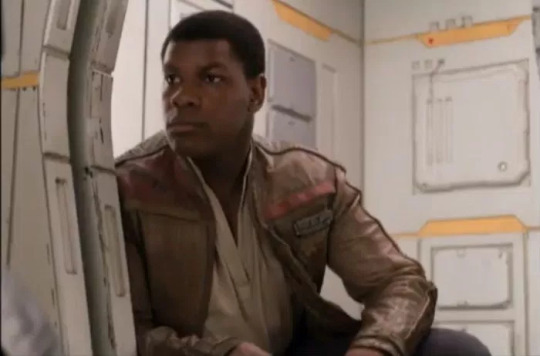
To all the people who say Finn’s arc leads nowhere, that it’s simply a side-adventure intended for little but to provide the character something to do; I point you at the moments when they infiltrate the New Order’s fleet. When the Code Breaker gives them away and Finn yells that he’s wrong that none of this matters, that’s a change! In fact, it’s a complete reversal of who he was at the start. And yet, the film isn’t even done with his arc! We don’t simply go from “opportunistic Han Solo type” to Rebel; the film then asks us what kind of rebel Finn is going to be. When he finally kills Phasma, in a moment of firm rejection of his own past, he returns to the front and instantly uses Poe as a model for his own behavior. His kamikaze attack on the Walker is a clear echo of the bomber run at the start, and Rose’s rescue of him is a completion of her own arc. For them both, it’s realization that one’s role in the rebellion needs to be tempered through interpersonal relationships. Both motivations have to co-exist. The rebellion isn’t simply about destroying the New Order, nor is it about enforcing good. It’s about empathy towards the people around us, whether it’s the horses on Canto Bight, or the enslaved children in need of a symbol of hope, or the rebels fighting to survive against overwhelming odds. It’s not about heroism for the sake of heroism, it’s about protection. In this way, the entire symbol of the Rebellion, what that insignia means exactly, is deconstructed, and reconstructed, so in the end, when the child holds up the ring, it means something new, something bigger and deeper.
If Finn’s narrative forces that character’s growth through an examination of what the Resistance actually means, than Poe’s is a firm rebuke of the type of heroism Star Wars has always reveled in through a simple, but surprisingly elegant, little character arc. To Poe, heroism is about individualistic action. In the film’s opening segment, Poe is told by his commanding officer to abandon an attack on a battleship, but refuses to do so. Instead, he orders a bombing run on a battle cruiser, an attack that results in the destruction of five crafts but also destroys their target. To Poe, this is a sacrifice, but also a successful moment of heroism. It’s telling that the movie refuses to make the sacrificed soldiers faceless, instead keeping us locked in one of the doomed crafts. It’s a sad but in the end, rousing moment, which is undercut by Leia’s brutal disappointment in Poe’s action. To Leia, five less bombers for future actions, and while the Imperial ship was destroyed, the enemy likely has many more like it. More of those doubtlessly exist than Rebellion bombers.

When Leia is nearly killed and Holdo takes command, we’re left to expect a very traditional film narrative. In more blockbusters than I can name, our hotshot young lead will break the incompetent chain of command to make the final strike which will turn the tides of war. With the fleet under near constant duress in a lengthy space chase which brilliantly creates a ticking clock around the fact that the Rebellion is underfunded, Poe chooses to send Finn off in an attempt to infiltrate the Star Destroyer and save the day. This places him head to head with Holdo, who, as a viewer primed by dozens of action films, we immediately write off as an overly dismissive empty shirt without a plan. When Poe calls her a traitor, and perpetrates a coup, it’s a rousing moment with our ragtag leads desperately fighting to save the day.
Instead, the plan fails. Finn is caught and Poe’s coup is taken out, by Leia of all people, one of our original ragtag rebels. It’s easy to go “what was the point of all that”, and well the point is failure. In one of the film’s greatest moments, we just have Leia and Holdo talk about what it means to be a woman and a leader, and we realize that our stuffed shirt had a plan all along, one she kept close to the vest in case the issue was not an electronic tracker, but rather a traitor. Oh, and Poe’s failure not only led to the capture of Rose and Finn, but in turn, leads to the discovery of Holdo’s plan, and the death of nearly half the remaining rebels. And Holdo, who we are primed to believe doesn’t believe in individual heroism, sacrifices herself in one of the film’s most striking shots, not to achieve victory, but to give her people the time they need to escape. It’s a cruel calculus, but as Holdo tells Leia, the need for sacrifice should not be an easy or quick decision, but is sometimes necessary. That’s a lesson they’ve had to learn.

Think about what the film is doing for a second. Everything a Star Wars movie has primed us for in the past, a tidy narrative thread, an easy plot progression and a warm embrace of individualistic heroism as a means to win not just a battle, but a WAR, have been rejected. The film has dismissed tidy plotting in favor of thematic questioning and deeper character arcs. The narrative forces Poe to confront his own failure, and in turn, he learns from it. It’s a lesson Leia clearly learned between that initial trilogy and this one, that leadership sometimes involves heroic self-sacrifice, but it can also mean sending off someone to die in order to crawl away, or realizing that the deck is stacked against you. Poe, in turn echoes Leia at the end, ordering Finn not to do what he himself had done at the start before calling a retreat, an escape to reorganize and fight another day. The passing of the baton is codified in his final scene with Leia, when he gives the order to leave, the men look at her, and she says to follow his orders.
If Finn’s arc led to a re-evaluation of the rebellion, and a personal transformation into a real “rebel”, than Poe’s arc asks us to question our view of heroism, and how these films portray them. The conclusion appears to be that individual heroism is in some contexts important, Holdo’s sacrifice, and later Luke’s MATTER, but that it can’t be at the expense of grander strategy, or of the collective. Losing a dozen lives and five ships in a bombing run to merely take out a target that can be replaced is a waste, as much as we might enjoy the space battle, or the epic action. Losing one to give them the time to escape, that’s real heroism, a willingness to sacrifice oneself not for victory, but for the future. That’s what hope is.

This takes us to Rey, and the final major story strand of the film, and by far the most complex and interesting. Rey begins this film as a lost and dejected student, but also as someone we as the audience are meant to believe has a grand and dynastic destiny. Many of us believed at the end of the Force Awakens that she was clearly a Skywalker, and that this trilogy will clearly end with her redeeming Kylo Ren and killing Snoke in an echo of the finale of the Return of the Jedi. But first, we thought, she must seek the help of Luke, who will clearly teach her the ways of the force like Yoda did.
Instead the film pivots to the side in an incredible rebuke of the franchise as a whole, one that doubtlessly infuriated some fans, when Luke takes this symbol of the franchise, his lightsaber from everyone’s two favorite installments, and tosses it over his shoulder and walks away. We later learn that Rey, who we assume must be connected to the characters we know and love, came from nothing. She’s just… Rey. Rian Johnson proceeds to fundamentally dismantle the notion that the Force can be understood as a fight between Good and Evil, with the Jedi on one side and the Sith on the other. In one of the film’s greatest moments, he has Luke deconstruct the entire notion of the Jedi. If there is a force that connects all things, one that requires a balance of the light and the dark, and you were lucky enough to be able to feel it inside of you, understand it deep in your soul, and put out your mind and touch it, what hubris is required for you to think that you should control it and bend it to your will in order to do anything, whether good or evil. It’s so much bigger than any Jedi or any Sith, and the temptation to abuse it is to strong.

In fact, Rey, upon seeing the dark force hole beneath the ground, is instantly tempted towards it, not out of evil, but curiosity. This terrifies Luke, who urges her not to explore it, ignoring that his own evolution required him to confront the dark within his own soul. Rey, in turn, is changed by confronting the Dark side, but also by doing so, is able to see it for what it is.
The film de-exoticizes the dark side. In the Prequels the Dark Side is a fountain of youth, and that power is corrupting. In this, more interestingly, it is a false salve for broken souls. The Last Jedi asks if being a Jedi should be more than abstinence from the Dark and in turn, contrition, but rather should involve confronting it, exploring it, and through that process recognizing that it’s empty. That the Dark Side is portrayed as a mirror which reflects only what Rey puts into it is a striking metaphor. The endless reflection seems to promise that at the end there is meaning, but when she wills herself to see the front of the line, it is just another mirror. There is no deeper meaning there, only an endless and selfish self-examination. In the end, its emptiness will only leave you disappointed and broken, like it has left Kylo Ren. For me, that seems a particularly strong symbol for the uselessness of rage and petty vindictiveness. Frankly, it also works really well as a metaphor for substance abuse.
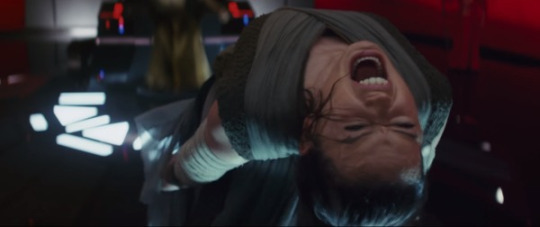
The Dark Side as a salve ties into the scenes where Kylo and Rey are connected. Those bits are charged with anger and rage, but also a sexual energy that hasn’t really been visible in the series before. That their plot culminates in a moment with the two of them, sweaty, back to back, swinging phallic blades in a vaginal red room in a desperate effort to free themselves of darkness is so on the nose that Freud would probably orgasm watching it.
For Rey, the dark side is tempting, but she chooses to reject it because of her need to protect others and live outside of herself. Kylo, in turn, is provided the same choice as Vader had at the end of Return of the Jedi, and chooses the opposite path, embracing the Dark Side. I think a lot of why that is comes down to motivation. For Vader, the Dark side was a path towards a power that he believed could help others, but it provided no such ability, only further self-deterioration. His transformation was a gradual path into sin, one that provided him with no rewards but empty power. Kylo Ren, in contrast, is a product of abuse, his embrace of the Dark Side comes from an internal rage and emptiness that are inherently part of his being, one that has likely always existed, but was perpetuated when he believed that his own trusted father figure had both rejected and considered killing him. The Dark Side, to Kylo Ren, provides a sense of meaning, an ability to violently erase the past and create a new future. He sees himself as the forest fire that will burn down the trees and leave the soil ripe to grow something new. In truth, as much as he claims he wants to “kill the past”, he is completely stuck in it.

This is a very different view of the Dark and Light side than we’ve seen before. It’s much less attuned to some religious binary of good and evil, and more in line frankly with what leads to real heroism and abuse. That the dark side and systemic abuse is linked in this film with violence against animals is in line with that. The light-side requires co-existence, as we see with Luke as he lives alongside the caregivers and drinks milk from the cow creatures who willing share it. He fishes yes, but only to eat what he requires. The Porg meanwhile co-exist in every crevice as urban animals, ones who can create their home on the Millennium Falcon, nestled in little nests in the nooks and crannies. To Rian Johnson, they are not pests to be eliminated, but the same life the Force represents.
Let’s talk about Luke, possibly the most divisive aspect of this film. It would be easy to say that Luke has become the “dejected martial arts master” trope, and there is some truth to that, but his reason for being that way are more interesting than the traditional model. It’s true that trope is built on the idea that your first apprentice turned evil and that in turn you are unwilling to train a new one, BUT, and this is a big but, in the traditional narrative the Master is, in the end, innocent of any transgression except ignoring the warning signs. One can look at Obi-Wan’s failure to notice Anakin’s fall in the prequels as a traditional example of that narrative. Luke initially pitches that version of Kylo’s origins to Rey, but we later learn that Luke had a “do you kill baby Hitler” moment where he considered murdering his newphew, a lapse in judgment which led to Ben’s rejection of his master and embrace of the dark side. The rise of the First Order and Han’s death are, by extension, partially his fault. It is that failure, more than any other lesson, which teaches Rey what she needs to know.
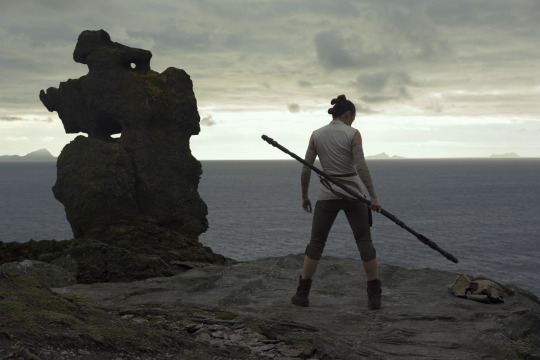
Yoda and Luke’s conversation about failure and the need to step aside for the next generation is a distillation of what this arc is about. The next generation has the capacity to outgrow you and learn from your mistakes. Rey can be a great Jedi Master because, in the end, Luke was both a great and a flawed one. She learns that even the Jedi are imperfect individuals who contain both light and dark. In the end though, the light side contains hope, and the dark side cynicism and nihilism. Kylo Ren has no hope that people can change or become something more than their origins, Rey, who came from nothing, but has become someone powerful, knows that’s untrue. To Rey, there is always hope. That hope is, as Poe says, the spark that lights the rebellion.
A lot of people don’t like how this arc plays out since they feel it cancels out Luke’s heroism from the original trilogy, or believe that Rian Johnson is rejecting what the Jedi are supposed to mean. I think, in contrast, the director just sees good and evil as more complicated concepts. To him, a cackling villain like Snoke is a dull one, and his off-handed killing of what we assumed was the big-bad is a rejection of that mustache-twirling concept. In turn, he refuses to portray his heroes as paragons.
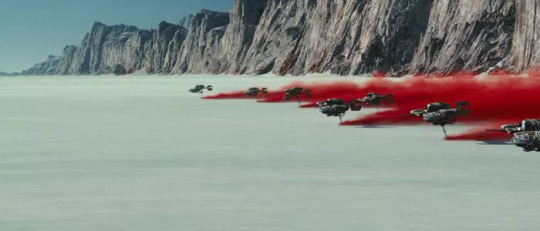
Luke, as flawed as he is, is still a hero. Rian Johnson knows that the audience wants to see him use the force to destroy all of those walkers, or beat down Kylo Ren. Instead he portrays the opposite. Luke merely gives the rebellion a chance to escape by talking to Kylo and trying to teach his student a final lesson. He tells his nephew the truth, that his actions will only ever cause him pain while the hope that lives on in the Rebellion and is visible in Rey is more powerful than his rage. You can’t squelch that hope. The spark will always light. The Jedi will always continue. The film does this in a moment that codifies Luke Skywalker as a legend. He finds victory by admitting his failure, by apologizing and by embracing the future at the expense of himself. And that acceptance, allows him to pull off the most incredible piece of Force-use in the franchise, a “galaxy-spanning feat of astral projection that exemplifies his power”. It’s a soaring moment of character vindication, an impossible act that uses up so much of his spirit that it erases him from existence, although you can see a final moment of hope in his face and a sad recognition of where he came from as he sees the twin moons of tatooine set in his mind’s eye. I found his goodbye, and what it says about the franchise and where it’s going from here, surprisingly moving.
The Last Jedi is a near-perfect film thematically and from a character perspective. It has flaws otherwise. Like most of the films in the series it relies on a heavy use of coincidence. Some of the jokes don’t hit. It can be clumsy from a plotting perspective. There are moments of cheese in here that are either going to work for you or won’t. Leia’s reflexive use of the force to fly to safety struck me as especially problematic. It’s also a long film, and jumps between its three narratives so frequently that at times it can appear narratively disjointed, even if the various threads are on-track. This is partially because the order in which we watch events are clearly not the order in which they happen. Finn’s entire story takes place in about 20 hours in a single day, while Rey’s, in comparison, takes place over nearly a week. The cross-cutting is a narrative device, not a temporal one. I also think the film’s refusal to accede to narrative convention, and desire to really examine what the Jedi, heroism and Rebellion mean today, can also be deeply jarring to people who expected a more traditional follow-up to the crowd pleasing Force Awakens.

I see some issues in the film, and can nitpick various aspects to death, but the first time through, all I felt was joyous. I was so happy that Rian Johnson took these myths seriously. I felt ecstatic that he felt the desire to make sure that all four of our principal characters were given their due, while still fleshing out the universe in new and surprising ways. I like that the movie expanded the worlds, made them feel larger, and added stuff at the periphery that can be explored in the future by other writers and directors. Most importantly, I found the film to be a whole lot of fun.
It left me, for the first time since I was a child, deeply invested in this universe and where it goes. While I’m interested to know whether Solo will be any good, and feel excited to see what JJ does with Episode 9, I’m far more enthusiastic to see what Rian Johnson will do with his new blank-slate trilogy going forwards. That all three are coming up soon in the next few years, and are exciting in such different ways, is a terrific place to be as a fan.
0 notes